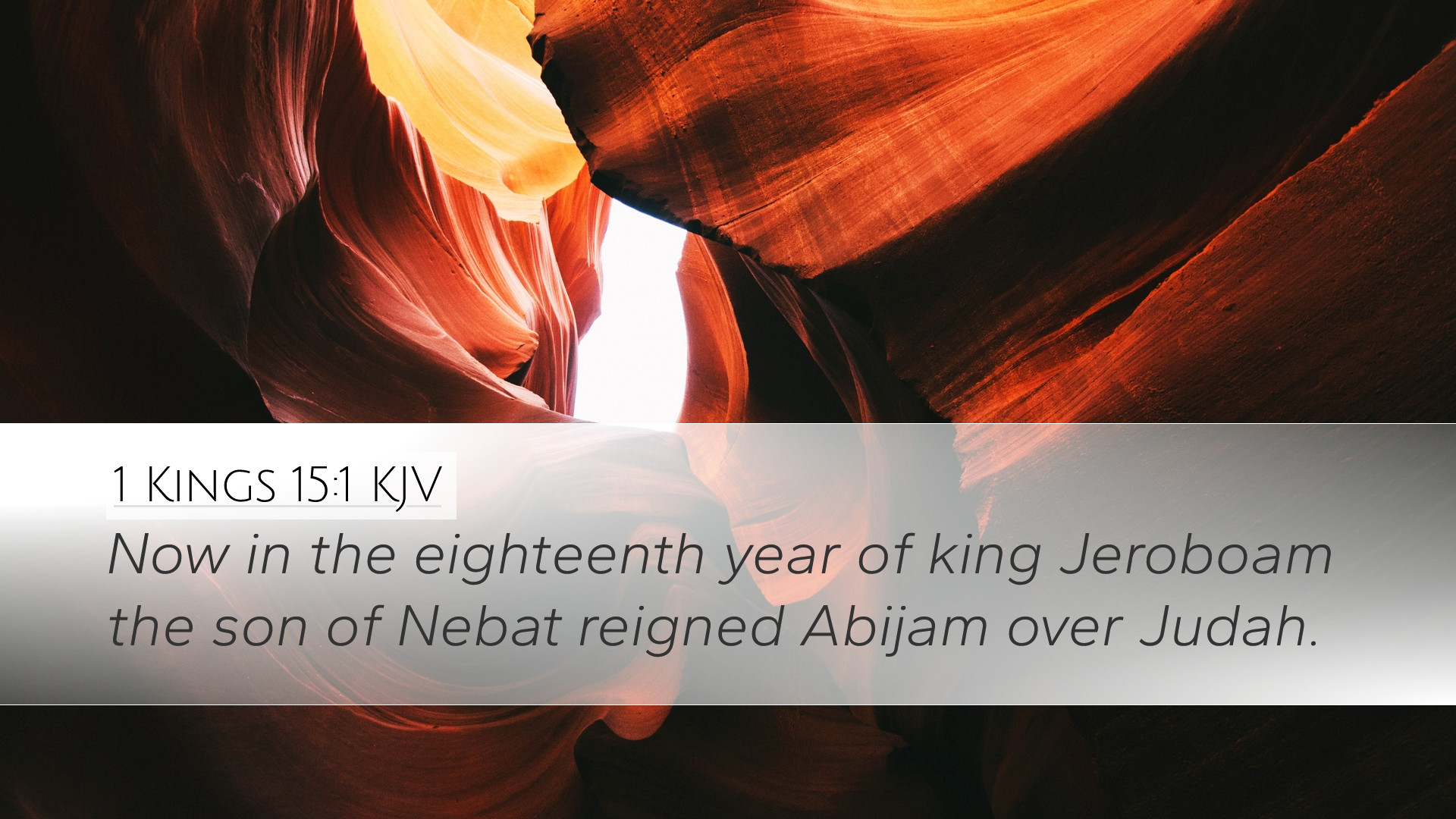Commentary on 1 Kings 15:1
Verse: "Now in the eighteenth year of king Jeroboam the son of Nebat reigned Abijam over Judah."
Introduction
The text of 1 Kings 15:1 introduces us to Abijam, a king whose reign is characterized by its connection to the divided monarchy of Israel. This moment captures the transition between leadership in the northern kingdom of Israel under Jeroboam and Abijam's rule over Judah. This commentary draws insights from Matthew Henry, Albert Barnes, and Adam Clarke, which provide a multi-faceted understanding of this pivotal moment in the historical narrative of the Old Testament.
Historical Context
Abijam, son of Rehoboam and grandson of Solomon, ascends to the throne during a period marked by significant political and spiritual challenges. The reign of Jeroboam in Israel is noted for its idolatry, contrasting the lineage of David from which Abijam descends. Understanding this context is vital for discerning the implications of Abijam's reign.
- Connection to Jeroboam: The mention of Jeroboam indicates a timeline that underscores the divided monarchy. Jeroboam's establishment of idol worship sets a controversial backdrop for Abijam's reign.
- Davidic Lineage: Abijam’s rule is a continuation of the Davidic line, raising questions about fidelity to God amidst the backdrop of idolatrous practices in the kingdom of Israel.
The Character of Abijam
Commentators are quick to highlight the complexities of Abijam's character and reign. Matthew Henry notes that though Abijam continued in the sins of his father, there remains a divine favor due to the promise made to David.
- Spiritual Failure: Despite his Davidic lineage, Abijam's character reflects a failure to uphold the covenant faith. Both Henry and Clarke point out that he did not fully return to the worship of Yahweh.
- Promised Continuity: Adam Clarke emphasizes that God’s covenant with David carried an unwavering promise, thus providing Abijam some measure of protection and legitimacy in his reign despite his shortcomings.
Overall Reign and Actions
This verse sets the stage for understanding the actions that Abijam would take during his reign. His leadership needs to be viewed through the lens of theological implications and moral expectations.
- Judah’s Political Stability: Barnes points out that Abijam's reign, albeit sinful, brought a degree of stability to Judah, contrasting the chaos present in the northern kingdom under Jeroboam.
- Military Engagements: Abijam would later engage in a notable battle against Israel, which serves as an important narrative in the historical timeline of the kings. This engagement is reflective of the ongoing tension between the two kingdoms.
Theological Reflections
The chronicling of Abijam's reign and the context of his ascension invites deep theological reflection. The narratives around his leadership resonate with themes of divine fidelity, human failure, and the complexity of character in biblical leadership.
- Fidelity to God: The foremost lesson stands as a reminder of the importance of covenant faithfulness. While Abijam's reign is riddled with failings, God's overarching narrative persists in honoring His promises.
- Human Flaws: The life of Abijam illustrates that God can use leaders with imperfections. It challenges those in leadership to reflect on their adherence to spiritual truths in their governance.
Conclusion
As we reflect on 1 Kings 15:1, we are reminded of the theological implications of leadership, lineage, and fidelity to God. Pastors, students, theologians, and Bible scholars can draw from this account lessons on the complexities of human leadership and the unwavering faithfulness of God. Ultimately, this passage invites not only a historical reflection but also a personal and communal exploration of what it means to lead faithfully amidst a world that often diverges from divine truth.


